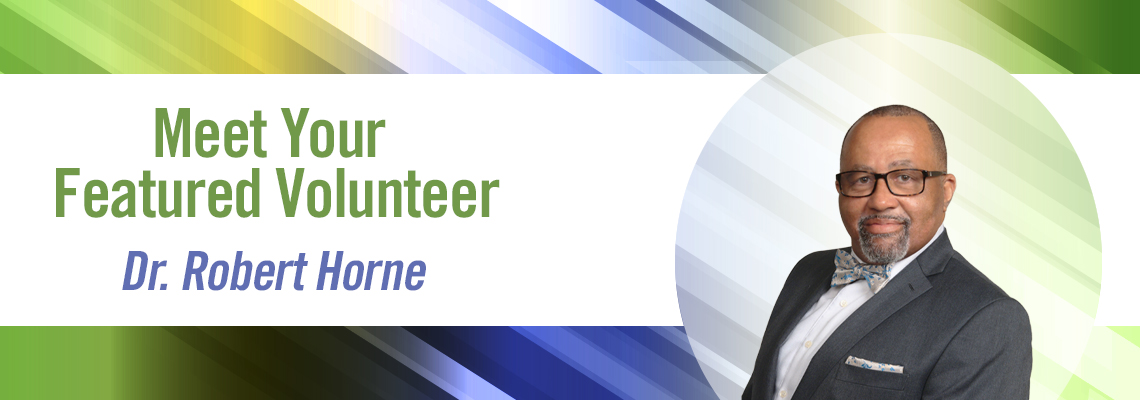
Foundation Connections

Volunteer Receives Lifetime Leadership Award
Published 7/29/2019
Dr. Robert Horne has proven for decades how much effort it takes to create change and improve counseling for the underserved and never-served.
At the recent inaugural Bridging the Gap Awards in Atlanta, Georgia, Dr. Horne received the Lifetime Leadership Award from the NBCC Foundation. Throughout his career, Dr. Horne has worked in various clinical mental health counseling settings, provided pastoral counseling, and served those with substance use issues and severe mental health disorders.
He is well known for the personal, 10,000-mile solo motorcycle trek, “Counseling Around America,” he took last July in which he touched all four corners of the United States to promote awareness of mental health and substance use in underserved and rural communities.
Dr. Horne first began his journey into the counseling profession in the 1990s. He obtained his master’s in agency counseling and began working in church settings, focusing on serving those with addictions.
While obtaining his doctoral degree, Dr. Horne became one of the “Dream Team” fellows in the NBCC Foundation’s first Minority Fellowship Program cohort. He personally witnessed and experienced the NBCC Foundation’s commitment to serve nondominant cultures and saw how the Foundation embraces the continuing changes within the counseling profession.
“I’m really grateful for the NBCC Foundation in that support for the MFP,” Dr. Horne says.
Among his many lifetime accomplishments is serving as the founder and director of the Addiction Studies Certificate Program at North Carolina Central University. Outside the classroom, Dr. Horne continues to change the profession of counseling by providing trainings on cultural sensitivity. One of his missions has been to change the negative connotation of the term “minority”; he prefers to say that he serves “nondominant” communities.
As a mentor for the NBCC Foundation, Dr. Horne credits his mentees with keeping him aware and active in counseling as they serve as resources for his own work as a counselor. Although he faces challenges as a mentor, he is grateful for these interactions.
“They keep me fresh and keep me on my toes as a mentor and as a counselor,” he says.
Dr. Horne continues to express his gratitude for being a mentor for the NBCC Foundation, and he hopes his own mentees will embody the spirit of giving back to the community by becoming mentors for others.
“I want others to have the opportunity to give back, and I love seeing my mentees grow in their profession. I always encourage them to become mentors so they too can learn to grow in this field just like I do every day.”
Dr. Horne’s mentoring style is one that reflects his passion as not only an active advocate for nondominant communities, but also as an advocate of self-awareness. He encourages his mentees to intentionally evolve as professionals and individuals.
“My mentoring philosophy is servant leadership,” he says. “I’m all about [showing] how to help others become the best they can be but not to imitate me, but to be the best individual they can be and to maximize their best self.”
When it comes to the benefits of mentoring within the community, Dr. Horne wants his mentees and other professionals to know that mentoring is also about creating memorable experiences and having the joy to build relationships for a lifetime.
Without mentoring, he says, “I would be a lot lonelier and a lot less in many areas. I would lack networking, especially with global connections. I would lack the experience I have as well as the knowledge and cultural awareness.”
As a mentor, Dr. Horne recognizes that counseling students need professional guidance beyond their classroom experience.
“I’m seeing that they are being given the idea that this is becoming a more rigid profession and the training is very limited, and that is not the case. I inform my mentees that they can do so much more in counseling than just seeing clients daily.”
Dr. Horne provides guidance and wisdom to his mentees on helping them understand how they can “move around” with different mental health and substance use concerns, especially with diverse populations such as those in the nondominant communities.
Dr. Horne also creates opportunities to incorporate his mentees into his professional presentations and webinars. He facilitates networking for mentees in order to provide connections from different specialties in the counseling profession.
“I witnessed how there were so many great fellows at Symposium who could gain so much knowledge from each other, and I’m making it my mission to continue to connect other cohorts with each other for the future Symposiums to come.”

